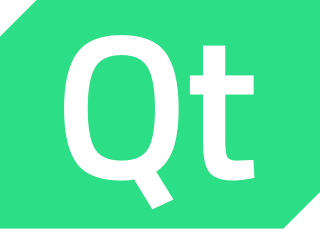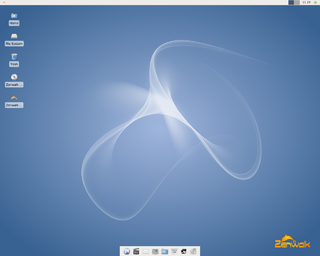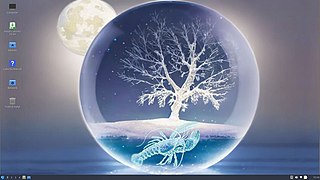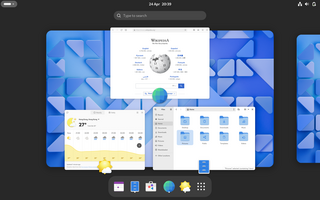
Qt is free and open-source cross-platform software for creating graphical user interfaces as well as cross-platform applications that run on various software and hardware platforms such as Linux, Windows, macOS, Android or embedded systems with little or no change in the underlying codebase while still being a native application with native capabilities and speed.

A light-weight Linux distribution is one that uses lower memory and/or has less processor-speed requirements than a more "feature-rich" Linux distribution. The lower demands on hardware ideally result in a more responsive machine, and/or allow devices with fewer system resources to be used productively. The lower memory and/or processor-speed requirements are achieved by avoiding software bloat, i.e. by leaving out features that are perceived to have little or no practical use or advantage, or for which there is no or low demand.

Fast Light Toolkit is a cross-platform widget library for graphical user interfaces (GUIs), developed by Bill Spitzak and others. Made to accommodate 3D graphics programming, it has an interface to OpenGL, but it is also suitable for general GUI programming.

TrueOS is a discontinued Unix-like, server-oriented operating system built upon the most recent releases of FreeBSD-CURRENT.

Zenwalk GNU/Linux is a desktop-focused Linux distribution founded by Jean-Philippe Guillemin. It is based on Slackware with very few modifications at system level making it 100% compatible with Slackware. It aims to be a modern, multi-purpose Linux distribution by focusing on internet applications, multimedia and programming tools. It comes with many specialized tools and is designed for beginner through advanced users, as it offers system configuration via both graphical tools and the command line.
A desktop environment is a collection of software designed to give functionality and a certain look and feel to an operating system.

LXDE is a free desktop environment with comparatively low resource requirements. This makes it especially suitable for use on older or resource-constrained personal computers such as netbooks or system on a chip computers.

PCMan File Manager (PCManFM) is a file manager application, developed by Hong Jen Yee from Taiwan, which is meant to be a replacement for GNOME Files, Dolphin and Thunar. PCManFM is the standard file manager in LXDE, also developed by the same author in conjunction with other developers. Since 2010, PCManFM has undergone a complete rewrite from scratch; build instructions, setup and configuration have changed in the process.

Lubuntu is a lightweight Linux distribution based on Ubuntu and uses the LXQt desktop environment in place of Ubuntu's GNOME desktop. Lubuntu was originally touted as being "lighter, less resource hungry and more energy-efficient", but now aims to be "a functional yet modular distribution focused on getting out of the way and letting users use their computer".

GTK is a free and open-source cross-platform widget toolkit for creating graphical user interfaces (GUIs). It is licensed under the terms of the GNU Lesser General Public License, allowing both free and proprietary software to use it. It is one of the most popular toolkits for the Wayland and X11 windowing systems.

GNOME, originally an acronym for GNU Network Object Model Environment, is a free and open-source desktop environment for Linux and other Unix-like operating systems.

LightDM is a free and open-source X display manager that aims to be lightweight, fast, extensible and multi-desktop. It can use various front-ends to draw the user interface, also called Greeters. It also supports Wayland.

Leafpad is a free and open-source graphical text editor for Linux, BSD, and Maemo that is similar to the Microsoft Windows program Notepad. Created with the focus of being a lightweight text editor with minimal dependencies, it is designed to be simple-to-use and easy-to-compile.

MATE is a desktop environment composed of free and open-source software that runs on Linux, BSD, and illumos operating systems.

Raspberry Pi OS is a Unix-like operating system based on the Debian Linux distribution for the Raspberry Pi family of compact single-board computers. First developed independently in 2012, it has been produced as the primary operating system for these boards since 2013, distributed by the Raspberry Pi Foundation.

Simple Desktop Display Manager (SDDM) is a display manager for the X11 and Wayland windowing systems. SDDM was written from scratch in C++11 and supports theming via QML.

LXQt is a free and open source lightweight desktop environment. It was formed from the merger of the LXDE and Razor-qt projects.

SparkyLinux is a desktop-oriented operating system based on the Debian operating system. The project offers a ready to use operating system with various desktops to choose from. SparkyLinux is released 3-4 times per year to provide the latest versions of all applications.

FeatherPad is a free software text editor available under the GPL-3.0-or-later license. It is developed by Pedram Pourang of Iran, written in Qt, and runs on FreeBSD, Linux, Haiku OS and macOS. It has few dependencies and is independent of any desktop environment.

Garuda Linux is a x86-64 general-purpose Linux distribution, based on Arch Linux operating system. It is available in a wide range of popular Linux desktop environments, including modified versions of the KDE Plasma 5 desktop environment. The term Garuda, originating from Hinduism, is defined as a divine eagle-like sun bird and the king of birds.




















